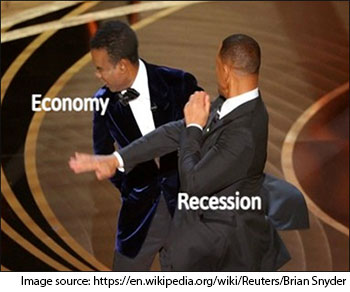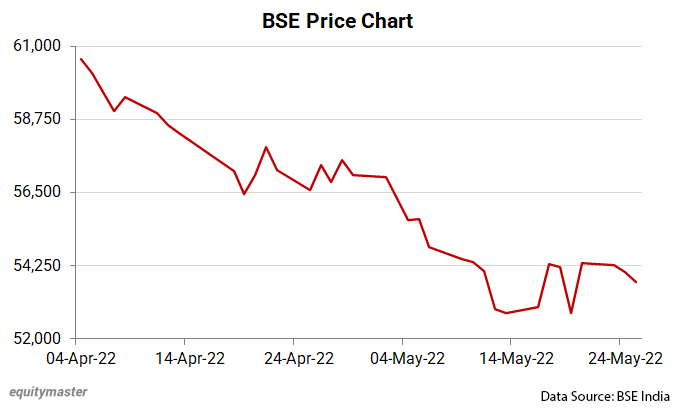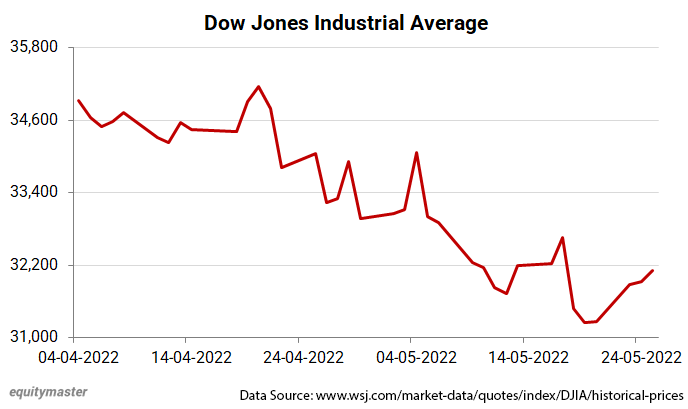- Home
- Views On News
- May 28, 2022 - The Coming Global Recession - Will India Buck the Trend?
The Coming Global Recession - Will India Buck the Trend?

After a two-year hiatus due to the Covid-19 pandemic, the world's top leaders met at the Swiss mountain village of Davos this week to tackle global issues and find solutions to the world's most immediate challenges.
And amongst these multiple threats, fears of an oncoming recession topped the worries of the world's leaders across business and government.
Economists fear that a recession could occur in 2023, particularly if the Fed's interest rate hikes stifle demand from individuals and businesses, or if its inflation strategy fails.
Others are even more pessimistic with Elon Musk stating recently that he believed we are already in a recession, and it will most likely worsen over the course of the next 18 months.
So, is the world headed for a recession? Opinion is divided on that question, with economists warning of a recession while bulls dismiss those fears calling them exaggerated.
But as seasoned investors know, markets are forward looking, while economic data is backward looking. Over the last month, markets worldwide have tumbled.
The Dow Jones Index is down about 9% while the BSE Sensex has lost over 11% over the last month.


Maybe the markets are trying to tell us something about the looming recession...
Recession: The King of Bad Times
Defining a global recession is no easy task.
"Technically", a recession is defined by economists as two consecutive quarters of contraction in gross domestic product. These periods are marked by lower income, unemployment, fall in production and drop in retail sales.
The National Bureau of Economic Research (NBER) is generally recognized as the authority that defines the starting and ending dates of U.S. recessions.
As per NBER data, from 1945 to 2009, the average recession lasted 11 months. The most recent Covid-19 recession which began in February 2020 lasted only two months, making it the shortest U.S. recession in history.
But even though economic recessions are often portrayed as short-term events, the consequences of falling incomes, high unemployment and reduced economic activity can have lasting consequences to the economy and for individuals' economic situations.
Over the past four decades, recessions have occurred several times in advanced economies.
As the United States is the world's largest economy and is interconnected with most of the prominent economies, most of these global recessions have originated in the US.
Why the Global Economy May be Heading for a Recession
Predicting a recession has always been a difficult task for economists as there are a variety of reasons recessions take place.Changes in some variables such as asset prices, the unemployment rate, interest rates, and consumer confidence appear to be useful in predicting recessions.
Inverted Yield Curve
In March, 2022, the 2-year and 10-year Treasury yields inverted briefly for the first time since 2019, sending a possible warning signal that a recession could be on the horizon.
Historically, when the 2-year/10-year yield curve inverts, a recession has taken place on an average about 19 months later.
However, many economists believe the curve needs to stay inverted for a significant amount of time before it gives a valid signal.
And while the yield curve has been a reliable indicator about pending recessions in the past, experts say there needs to be corroborating evidence to confirm a recession is around the corner.
Inflation is Everywhere
"How about this weather?"- that was a good conversation starter up to now in America.
These days, complaining about higher prices has become a regular conversation starter instead.
Inflation dominates the average Joe's mind to an extent not seen since the 1980s, when prices were last rising at the current pace.
Americans are feeling the burden of inflation which makes economists wonder whether that means a recession is coming.
Businesses are struggling to make profits because costs have risen so dramatically over the last year. Getting food on the table is more expensive. So is filling gas in the tank. And high inflation means that buying a home is getting increasingly prohibitive.
And just as in the United States, central banks in other countries have been caught off guard by persistently high inflation.
After Russia invaded Ukraine, inflation has been much higher in light of rising commodity prices.
U.K. inflation hit a 40-year high of 9% in April for many of the same reasons that U.S. inflation rose 8.3% the same month - a big spike in food and energy prices.
British household energy prices climbed by 54% amid a surge in wholesale natural gas prices in late 2021 and further increases have not been ruled out this year.
Food prices on the other hand have increased so much that about 25% of Brits have resorted to skipping meals, according to a recent Ipsos survey conducted on behalf of Sky News.
Bank of England Governor Andrew Bailey said a surge in food costs could have "apocalyptic" consequences for the poorest people in society and the global economy.
High inflation is rampant across the world. Inflation hit a record high of 7.5% in April for the 19 countries that use the euro as higher fuel prices boosted by the war in Ukraine weighed on the region's economic recovery from the pandemic.
6 out of 10 of the most developed nations across the globe have annual inflation rates over 5%, the highest in over 30 years which poses a serious problem for central banks, which typically target inflation at 2%.
This has put central banks under significant pressure to raise rates and unwind their balance sheets accumulated during the pandemic's quantitative easing policy.
Experts are worried that a spike in interest rates would trigger a recession.
Shrinking GDP
Despite economist expectations calling for growth of 1%, the U.S. economy shrank at an annual rate of 1.4% in the first quarter of 2022-the first decline since the second quarter of 2020.
This marked a sharp reversal from a 6.9% annual growth rate in the fourth quarter.
Waning government stimulus spending related to the pandemic weighed on GDP. The decline in GDP was an outcome of a widening trade deficit as imports to the U.S. surged and exports fell.
The economy faced challenges such as supply disruptions related to the pandemic and the Russia- Ukraine conflict, labour shortages and high inflation.
A slower restocking of goods in warehouses and stores by businesses in the first quarter compared with a rapid build-up of inventories at the end of last year also pushed growth down.
The contraction was a surprise for many economists, who had predicted weak economic growth in the first quarter.
If the US experiences a second straight period of GDP contraction, that would meet the technical definition of a recession.
China's Zero-COVID Policy and Lockdowns
Most economists are worried about China as its strict zero-Covid policy has created a supply chain crisis.
With over 19% of the world's total output coming out of China, it is now such a large contributor to the global economy that any lockdowns there have a significant impact on global supply chains and its demand for goods and services from other countries.
Recent economic numbers from China continue to paint a grim picture for the country as the government's focus on eliminating all coronavirus cases is pushing it to the brink.
From new car sales to high tech equipment to major exports, the continuing lockdowns are hitting many sectors of China's economy.
Beijing set its annual GDP growth target for 2022 at around 5.5%, but this is looking increasingly like a tall order, economists say.
The International Monetary Fund (IMF) slashed its forecast for the world's second-largest economy this year to 4.4% in April as China continues to reel from the implications of Russia's invasion of Ukraine as well as the lockdowns.
This is IMF's second downgrade of its China forecast in just three months based on weaker overseas demand and heightened inflationary pressure because of soaring commodity prices, both made worse by Russia's war in Ukraine.
Experts don't expect China to abandon its zero-Covid stance any time soon with gradual movement away from these protocols unlikely until 2023 which means supply disruptions will persist for quite some time.
Economists expect China and the Russia-Ukraine conflict to drag down the global economy broadly this year leading to a recession.
Will India be Able to Avoid a Recession?
Moody's Investors Service recently slashed India's economic growth projection to 8.8% for 2022 from 9.1% earlier, citing high inflation.
"We have lowered our calendar-year 2022 growth forecast for India to 8.8 per cent from our March forecast of 9.1%, while maintaining our 2023 growth forecasts at 5.4 per cent," Moody's said.
Amid the current geopolitical developments, as exports slow down globally and central banks tighten their fiscal policy, it is widely expected that India may see an economic slowdown in the medium term.
Rising crude oil, food and fertilizer prices will weigh on household finances and spending in the months ahead.
RBI's rate hikes to prevent inflation will slow down the economy.However, India's underlying economic fundamentals are stronger as compared to other countries and despite the short-term turbulence, the impact on the long-term outlook will be marginal.
The results of reforms and schemes such as production-linked incentives and government's Atmanirbhar Bharat (self-reliant India) is expected to show up in the latter half of 2022.
This would lead to higher employment, increased production and increased spending which should balance out the slowdown and kick start economic growth.
India is looking to clock $350bn worth of services exports in 2022-23, a growth of 40% over the previous fiscal year as key sectors including travel, hospitality, and entertainment set to post swift recovery post pandemic.
As manufacturing moves out of China, India is all set to seize the opportunity and capitalise on it.
The manufacturing sector witnessed a 460% jump in 2021-22 as against 2019-20 with new investment announcements by the private sector increasing by 150% in the same period in comparison to the previous financial year.
India has emerged as a preferred investment destination which is evident from the fact that India has recorded highest ever annual Foreign Direct Investment (FDI) inflow of 83.57 billion US dollars in the last fiscal year.
This could be enhanced even further due to the geopolitical problems due to the Russia-Ukraine war.
On the other hand, the financial system is more resilient now with bad debts of banks having been cleaned up. And with digitalization, the economy is expected to get more formalised giving the government more tax-raising clout.
Finally, most of India's sovereign debt is owned domestically which protects the country from the risk of defaults and a full-blown sovereign debt crisis, which several developing economies could face in the coming months and years.
To Wrap it all up...
After more than two years of a devastating pandemic and the global economic shockwaves triggered by the Russia-Ukraine conflict, growth prospects of the world's economy seem uncertain once again.
The IMF slashed its projections for economic growth only one quarter into the calendar year by almost 100 basis points- 4.4% to 3.6%. It predicts that global growth will slow sharply from an estimated 6.1% in 2021 to 3.6% in 2022.
Given the scale of supply chain disruptions, it is possible that the IMF could issue a further downward revision to its growth projections later this year.
The threat of recession is real, especially in advanced economies but in India, things look better.
Central banks around the world will have to take care while increasing interest rates. Increasing rates too fast could lead to a recession.
RBI governor, Shaktikanta Das has made it clear that the central bank will not use excessively harsh measures to restrain prices.
The Monetary Policy Committee will increase interest rates to contain inflation but ensure that growth revival is not derailed.
It is also expected that the ban on exports of key commodities and the recent reduction in fuel taxes may result in relieving price pressures which may make it unnecessary for the RBI to increase rates too rapidly.
India is placed in a much better position as opposed to most economies due to its strong credit growth, increasing investments by the corporate sector and a high budget allocation to capital spending by the government.
On the side-lines of the recently concluded World Economic Forum Annual Meeting, Borge Brende, President of the World Economic Forum had this to say:
"The threat of recession is real, and especially in developing countries and in emerging economies, we are seeing that they are faced with big challenges. I think for India, it looks better as we do think the country will grow 8% this year. But there are other countries that are really struggling."
Most economists believe the Indian economy seems strong enough to maintain solid growth momentum.
Despite the pain they bring, recessions are not all bad...
Not all businesses and industries feel the same pain during economic downturns. Some businesses even benefit as consumers cut back on substitute products.
Recessions are painful for investors and businesses who rely heavily on debt and leverage to take on risky, speculative investments or business investments. During a recession, there is reallocation of assets and real resources which can create good buying opportunities in stocks as well as hard assets such as homes amongst others. Strong businesses can thrive as labour and capital become cheaper.
In case there is a recession in the next few months, it should be looked at as a bump in the road that India is reasonably equipped to withstand as the long-term growth story of the country is still intact.
The author, Bo Bennett once said, "As sure as the spring will follow the winter, prosperity and economic growth will follow recession."
After a recession as economies recover, equity markets often achieve higher highs than before the recession.
Hence, such times present a money-making opportunity to investors with the time and patience to wait it out.
In the times we live in, patience is a superpower... Hold on!
Happy Investing!

Yazad Pavri
Cool Dad, Biker Boy, Terrible Dancer, Financial writer
I am a Batman fan who also does some financial writing in that order. Traded in my first stock in my pre-teen years, got an IIM tag if that matters, spent 15 years running my own NBFC and now here I am... Writing is my passion. Also, other than writing, I'm completely unemployable!


Equitymaster requests your view! Post a comment on "The Coming Global Recession - Will India Buck the Trend?". Click here!
Comments are moderated by Equitymaster, in accordance with the Terms of Use, and may not appear
on this article until they have been reviewed and deemed appropriate for posting.
In the meantime, you may want to share this article with your friends!